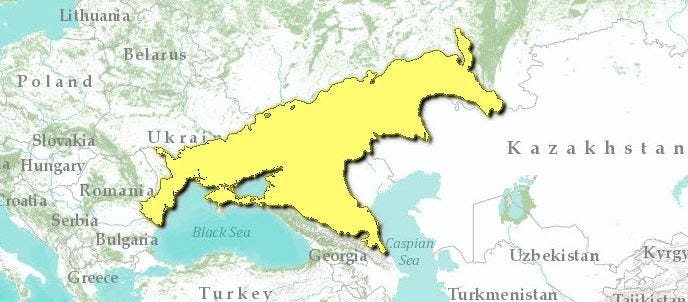Steppe 1.0, Going Nomad
The early Indo-Europeans' great leap forward
[Editor’s note: updated 12/29/2023 to reflect advances in scholarship. Edits appear in bold.]
Before Rome was even a city, up until the age of the gun, the heart of Asia was ruled by nomads. These lords of the steppe struck terror in the hearts of men for thousands of years, and their conquests and defeats shaped the rise and fall of empires.
This is the story of those first nomads, the early Indo-Europeans.
They herded, they rode and they routed
Today 3.5 billion humans speak Indo-European languages, which dominate Eurasia from Spain to the Indian subcontinent. This is the legacy of the pastoralists who roamed the Pontic steppe north of the Black sea 5,000 years ago. They were the original Indo-Europeans. They pioneered the nomadic lifestyle, leaving behind hard toil at the plow and thankless foraging in cold Siberian forests. They chose instead to wander the open grasslands in search of fresh pastures for their herds of sheep, horse and cattle. They were the first to unleash young warriors raised as roving nomads upon the world, predatory packs marching the breadth of a continent in two centuries. We don’t know what they called themselves. We don’t know the names of those who led them. But their cultural innovations and the choices they made transformed our world and made us who we are today. These nameless people left no monuments or seminal texts. Instead, we live with their language, their gods and their genes.
These early Indo-Europeans did not rush into virgin lands. They first bowled over others who were similarly textless. So we have no written testimony of this scarcely human phenomenon steamrolling the settlements of stolid farmers whose ancestors had tilled the land for millennia. The nomads’ inexorable progress onward, onward, outward in concentric arcs, mowing down or swallowing up all who stood in their way, was marked by neither enduring architectural monuments nor ambitious infrastructure projects like Rome left those they subjugated. They came, they took, they surely slaughtered, and they clearly fathered. But with neither written words, nor enduring walls, how do we know them?
Like a black hole, they warped even the distant future of every adjacent nation they touched. And so, like astrophysicists studying a black hole, we grope our way to a picture of the prehistoric Indo-European nomads, not directly, but through the vast arc of Eurasian geography that curls around the windswept steppe to its west, south and east. These barbarian, nomadic Indo-Europeans gave rise to civilized, urban Indo-European societies as far apart as Italy, Anatolia, Iran, and India. The history, culture, mythology and linguistic patrimony of most of Eurasia, particularly its most dominant empires, bear unmistakable if begrudging testimony to violent brushes with the nomad peoples of the steppe. We must only be patient and creative enough to tease out these common threads, field by complementary field. Threads which in the end bind us all. Millennia later, we still bear the scars the invaders left on our ancestors, share their age-old obsessions and journey on their conveyances.
The nomads picked fights they thought they could win. The only way to survive a conquering force as relentless as the steppe raiders was to emulate it, as fully and as quickly as possible. Steppe genes were forced on our foremothers. And in a rushed bid for survival, the societies which resisted and eventually flourished in the face of nomadic predations absorbed as many superior steppe innovations as they could, both the tools and the cultural baggage. If you can’t beat them, you could do worse than to selectively join them. The medieval knight and the Manchu cavalry are but warped refractions of the roving Hun.
Today, we can trace back those shared threads in myths, mores and mother tongues that span most of the breadth of Eurasia. Archaeology brings us a wealth of circumstantial source materials to interrogate. And the past two decades have been delivering an ever greater granularity of detail in the DNA record of modern humanity’s near-universal steppe ancestry.
In my first steppe post, I dug into the personal “why” of the steppe for me as a long-standing obsession. Now, I delve into what we can surmise or determine about the epochal force that burst out of the steppe 5,000 years ago. Given that this profoundly impactful band of humans made its mark without a single sympathetic contemporary chronicler, this look at the prehistoric steppe people is in large part about the painstaking “how” of reconstructing their unrecorded impact.


